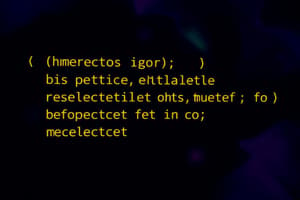Podcast
Questions and Answers
¿Cuál es uno de los aspectos más importantes de una función en C?
¿Cuál es uno de los aspectos más importantes de una función en C?
- Puede tener múltiples declaraciones
- Ayuda a reducir la duplicación de código (correct)
- Requiere la declaración de variables globales
- No puede tener argumentos
¿Cómo se declara una función en C según el texto?
¿Cómo se declara una función en C según el texto?
- `type function_name(parameter_list)` (correct)
- `type(parameter_list) function_name`
- `function_name(type parameter_list)`
- `function_name(parameter_list type)`
¿Qué se debe especificar al declarar una función en C?
¿Qué se debe especificar al declarar una función en C?
- El número máximo de llamadas a la función
- El tamaño de la función en bytes
- El tipo de retorno de la función (correct)
- El orden de ejecución de las instrucciones dentro de la función
¿Qué hace la siguiente línea de código en C: return a + b;?
¿Qué hace la siguiente línea de código en C: return a + b;?
¿Cómo se llama el bloque de código que realiza una tarea específica en C?
¿Cómo se llama el bloque de código que realiza una tarea específica en C?
¿Por qué las funciones son importantes en C según el texto?
¿Por qué las funciones son importantes en C según el texto?
¿Qué es la sobrecarga de funciones y por qué C no la admite?
¿Qué es la sobrecarga de funciones y por qué C no la admite?
¿Cuál es una ventaja de utilizar funciones en programación?
¿Cuál es una ventaja de utilizar funciones en programación?
¿Qué promueve la modularidad en el diseño de código?
¿Qué promueve la modularidad en el diseño de código?
¿Por qué es importante evitar hacer funciones demasiado generales en C?
¿Por qué es importante evitar hacer funciones demasiado generales en C?
¿Cómo se pueden lograr efectos similares a la sobrecarga de funciones en C?
¿Cómo se pueden lograr efectos similares a la sobrecarga de funciones en C?
Flashcards are hidden until you start studying
Study Notes
C Programming: Exploring Functions
C is a foundational programming language that's been shaping the world of software development for over four decades. At its core, C is packed with powerful tools, and one of its most important features is the ability to use functions. In this article, we'll delve into the world of C functions, covering their syntax, use cases, and best practices.
What is a Function in C?
In C, a function is a self-contained block of code that performs a specific task. Functions can be called multiple times, taking input (arguments) and producing output (return values). They promote modularity and reusability, helping to reduce code duplication and make code easier to understand and maintain.
Function Declaration and Definition
A function in C is declared using the type function_name(parameter_list) syntax. The type specifies the return type of the function, while the parameter_list specifies the input arguments. The function definition is enclosed in curly braces, and it must have the same signature as the declaration.
int sum(int a, int b) {
return a + b;
}
Calling Functions
To use a function, you simply invoke it with the function name followed by a list of arguments enclosed in parentheses.
int result = sum(3, 5);
Return Values
A function can return a value by using the return statement. The returned value can be used by the calling function.
int difference(int a, int b) {
return a - b;
}
int main() {
int diff = difference(10, 2);
printf("The difference is: %d\n", diff);
return 0;
}
Function Overloading
C does not support function overloading, meaning you cannot have multiple functions with the same name but different parameter lists in the same scope. However, you can achieve a similar effect by using a naming convention, such as prefixing the function names with the argument count, like add_2, add_3, and so forth.
Advantages of Functions
- Reusability: Functions can be used multiple times in a program, reducing code duplication.
- Modularity: Functions promote modular design, making code easier to understand and maintain.
- Improved code organization: Functions group related code together.
- Reduced debugging efforts: Functions make debugging easier because errors are more localized.
Best Practices
- Keep functions short and focused.
- Use meaningful names for functions, variables, and arguments.
- Avoid unnecessary arguments.
- Avoid making functions too general.
- Use comments to clarify the purpose and usage of functions.
By mastering the use of functions in C programming, you'll be well on your way to developing efficient and reusable code. Happy coding!
Studying That Suits You
Use AI to generate personalized quizzes and flashcards to suit your learning preferences.




